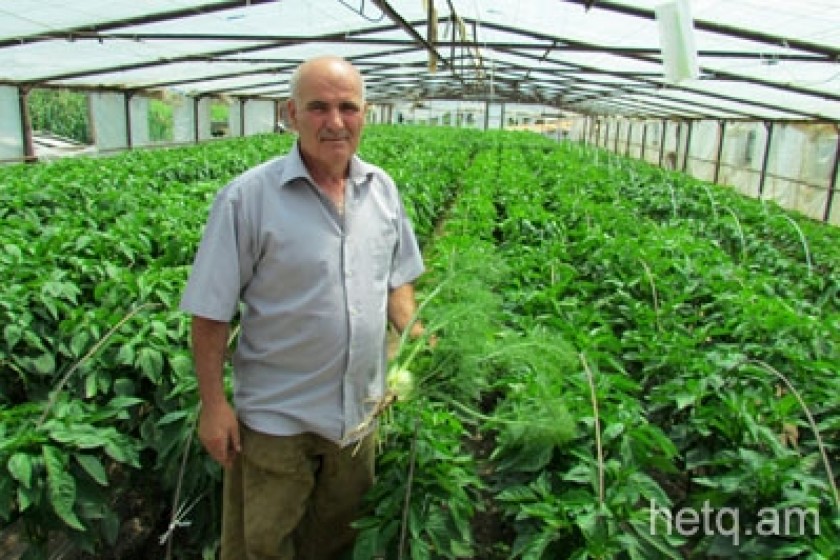
Farmer Simon Jamalyan: "Government must recognize villagers and the land as national treasures"
The hothouse tended by 62 year-old Simon Jamalyan covers 1,500 square meter plot outside his home in the Armavir village of Griboyedov.
Mr. Jamalyan gets up early, just as the sun is rising, and spends most of the day in the hothouse. He only takes a break in the afternoon when the temperature inside hits 50 C. Then he’s off to tend to a one hectare plot of basil growing outside.
A mechanic by trade, Simon started hothouse farming ten years ago and he’s been a devoted convert ever since.
His operation has been recognized as a prime seedling nursery ever since 2007, under the aegis of the Millennium Challenge’s project “From water to the market”. A certificate of merit from the Armenian government is proudly displayed on the wall of his house. Simon was also presented with a gift of an air filtration system from the Americans for his achievements.
Many top government officials, including Prime Minister Tigran Sargsyan, have travelled to Griboyedov to see how a successful hothouse is run.
Mr. Jamalyan is now turning his attention to bringing back certain heirloom varieties of vegetables and herbs on the verge of extinction. He wants to save these varieties because of their richer taste and smell.
Last year, at the farmers market on Kievyan Street in Yerevan, Simon acquired some permanent customers who still call him to place orders for his specialty produce.
The hothouse employs a drip irrigation system and hardly a shovel or spade is ever used.
Despite his success, Mr. Jamalyan has problems like any other farmer, especially when it comes to selling what he grows. He’d like to operate the hothouse during the winter but says that gas prices are prohibitive.
Simon became teary eyed when he spoke about the plight of the land and the villagers who work it. He made an open plea to the government to regard the land and the village farmers as the salt of the earth and “national treasures”, since they keep the country afloat.
He laments the fact that Armenia’s rural populace has turned away from farming and instead is seeking its fortunes on foreign shores. Simon says the land suffers too from not being cultivated, becoming barren and dry.
Mr. Jamalyan proposes that village farmers hand over the land they cannot cultivate to the local municipality for a period of five years. The municipalities in turn would allocate the land to those who can.
“There are uncultivated lands and people who want to work those lands but the owners, many of who have left, are asking unrealistic prices. The weeds are infesting all the good land in the Ararat valley. Our prime task is to save this area down every single square centimetre,” Simon says.
The farmer also points out the problem of the lack of agricultural advisory councils in the villages. He wants to create such a body to advise local farmers about correct agricultural techniques and also wants to set up a laboratory for soil analysis.
Mr. Jamalyan says that local farmers only use nitrogen-based fertilizers that can harm the soil in the long run and includes health risks.
“Farmers buy fertilizers without knowing what their soil actually needs,” he says.
Mr. Jamalyan says that at various conferences and meetings he’s proposed that TV stations devote ten minutes a day to programming about correct farming techniques and instructional information to educate local farmers. Sadly, nothing has been done in this regard.
“The richer the villager, the better off the nation is as a whole. The gene pool of our sages has been preserved in the villages. Do a bit of research and you’ll discover that 80-90% of our sages have been common village folk. The country needs a national ideology, a plan of action, for the future. We lack one today. Armenia once was a regional leader in scientific potential. But now? Europe has a lot to learn from us. We went without a state government for 500 years but remained Armenians. One of our guiding principles should be to preserve the sacred Armenian family instead of receiving European grants and preaching homosexuality. The only thing to borrow from Europe is the German sense of precision and being on time. We should be the ones serving as an example of an ancient nation,” argues an emotional Mr. Jamalyan.
He says that a true farmer never gets rich because any profit is ploughed back into the oil.
“People take loans to install new Euro windows. My house is 60 years old and has the same doors and windows. Sure, I’d like to modernize the place but all my spare cash is reinvested in the land. I don’t mind if my bathroom and shower are somewhat outdated, just as long as the business survives.”
 Videos
Videos Photos
Photos




Comments (3)
Write a comment